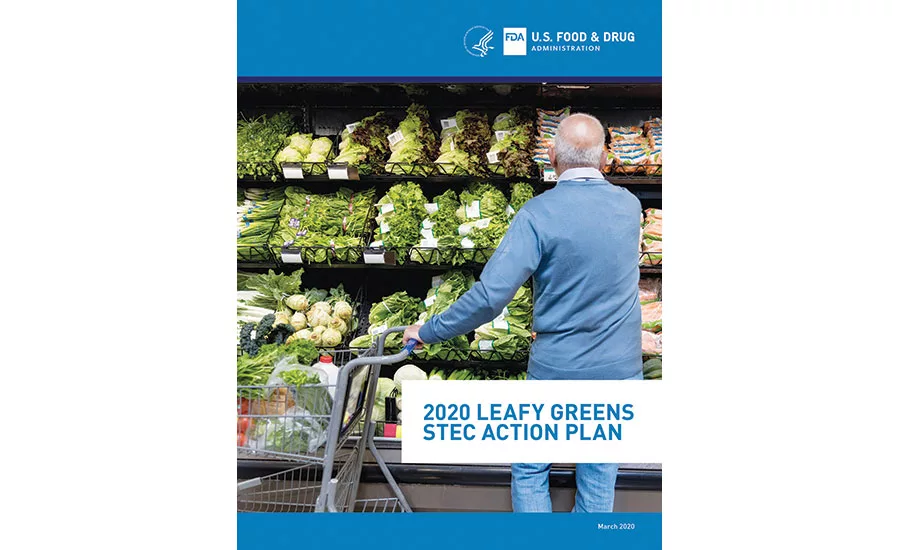Manufacturing News
FDA takes measures to promote the microbiological safety of leafy greens

Over a decade or two, FE has reported the repeated and repeated E. coli O157:H7/STEC (Shiga toxin-producing E. coli) infections in leafy greens, especially in lettuce and spinach from the Salinas area of California, and last year from Yuma, Arizona. Most recently FE (Feb. 2020) cited New York Senator Kirsten Gillibrand’s efforts in introducing a bill to allow FDA to take on-premises environmental samples on USDA farms, and FE covered the issue of produce farms being located adjacent to CAFOs as former FDA Deputy Commissioner Michael Taylor (FE, July 2019) described at last year’s Food Safety Summit.
To combat recurring food safety issues, the agency has come up with a plan for 2020, called the “2020 Leafy Greens STEC Action Plan.” The document outlines a set of preventive, responsive and evaluative measures to promote the microbiological safety of leafy greens.
The Produce Manufacturers Association welcomes the move as a step in the right direction. “We support efforts to provide end-to-end traceability and establish uniform traceability requirements, invest in a systems approach and critical path analysis of adjacent land risk and verifiable interventions,” says PMA Chief Science Officer Maximum Teplitski.
The FDA document outlines several steps in improving agricultural water safety, enhancing inspection and auditing, doing microbiological surveys for the presence of STEC, and improving supply chain communications in terms of track and trace. While there is a lot of emphasis on testing and data communications, the paper also addresses geographical and land use issues, which are at the heart of the problem. E. coli O157:H7 doesn’t magically appear on produce; it comes from animal sources, primarily cattle—but goats, sheep and pigs can carry it as well.
A deeper dive into FDA’s commodity-specific action plan
FDA plans to advance work in three areas: “prevention, response and addressing knowledge gaps.” Expediting the improved safety of leafy greens will require collaboration between FDA and stakeholders in the public and private sectors, including industry and regulatory partners. The plan is designed to help foster a more urgent, collaborative and action-oriented approach.
Beyond FSMA, FDA wants to focus on several areas, some including:
- Developing a proposed rule for advanced agricultural water safety (other than sprouts)
- Enhancing inspection, auditing and certification programs
- Helping retailers define buyer specifications
- Setting up a leafy green data trust
- Performing microbiological surveys for STEC detection and enhanced sampling protocols
- Increasing awareness and the addressing of concerns around adjacent and nearby land use
- Establishing and strengthening regular outreach and communication programs for stakeholders in growing regions
- Publishing a Salinas outbreak investigation report
- Conducting follow-up surveillance on the fall 2020 growing/harvest season
- Promoting tech-enabled traceability
- Advancing root cause analysis activities
- Conducting longitudinal studies, for example, looking at pathogen survival in water reservoirs and pipelines
- Looking at adjacent and nearby land use
- Creating a sampling assignment with California
FDA plans to emphasize the importance of using good agricultural practices while the agency works on a proposed water rule. In addition, FDA will support the EPA approval of an FDA-developed protocol that chemical companies may use in obtaining registration of antimicrobial products for treating irrigation water.
With respect to longitudinal studies, the FDA has launched an initiative with support from the Arizona Department of Agriculture, and in conjunction with the University of Arizona Cooperative Extension, the Welton-Mohawk Irrigation and Drainage District and members of the leafy greens industry to better understand the ecology of human pathogens in the Yuma growing region. Exploratory discussions have also been initiated in the Salinas and Santa Maria regions of California.
Looking for quick answers on food safety topics?
Try Ask FSM, our new smart AI search tool.
Ask FSM →
Activities occurring on nearby or adjacent land can influence or contribute to contamination. Information about nearby or adjacent land uses can help growers with effective mitigation strategies.
FDA will collaborate with federal and state partners, research organizations and industry stakeholders to identify existing data and knowledge on the impact of adjacent and nearby land use on growing areas and help growers implement effective mitigation strategies.
FDA will work with government partners and industry stakeholders to explore the feasibility of implementing preharvest best management strategies for cattle raised near leafy green growing areas and encourage research into preharvest mitigation strategies for cattle.
Regarding the use of compost materials in California, FDA will continue analyzing samples of commercial compost for the presence of foodborne pathogens to inform baseline understanding and encourage standardization and collection of data around compost.









